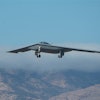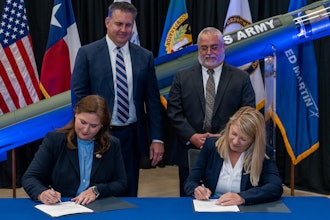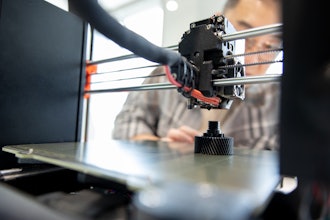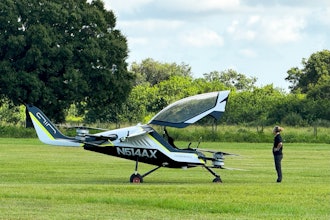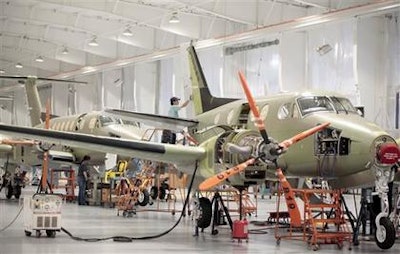
WICHITA, Kan. (AP) -- Tired of hearing about jobs getting outsourced from Wichita?
So are Shawn Ehrstein from Wichita State University and Scott Yeakley from Beechcraft.
In the past year Ehrstein and Yeakley, aviation engineers, helped bring back to Wichita the equivalent of more than 50 aerospace jobs formerly outsourced, WSU officials said.
Leaders at WSU now say the partnership idea is so intriguing that they will try to replicate it: bringing back more jobs and redefining public-private partnerships in the future.
The idea they devised was unusual:
Take a bunch of WSU engineering undergraduates, mostly young people. Train them intensely. Then integrate them as full team members on real projects at Beechcraft.
This kind of thing isn't done often, Ehrstein said. Engineering is hard to learn and hard to do, so most companies would be reluctant to try this. Beechcraft has made it work, he said.
What Beechcraft got out of this were good employees at a reasonable cost, he said. What those undergrads got, two students say, was real-world job training.
About 80 WSU engineering students have done the work so far, producing about 1,400 person hours a week for Beechcraft for the past three years. By the end of this year, WSU students will have done 82,000 hours of engineering work for Beechcraft, Ehrstein said.
Some students in the program already have jobs - 11 at Beechcraft so far.
"Some of them we hired even before they graduated," Yeakley said.
One student, a junior in mechanical engineering from Andover named Landon Huslig, said he and dozens of other undergraduates got to work side by side for months with Beechcraft engineers.
"They didn't treat us like kids," he said. "They treated us like co-workers.
"Any help or advice we needed, they gave it to us."
It all worked so well that Ehrstein and the National Institute for Aviation Research, for which he works, have made partnership proposals to other Wichita companies. Ehrstein hopes to convince other companies that it is good business to bring more jobs home, where people can work face to face.
Much of the work done by these students would have been outsourced if not for the partnership, Yeakley said.
Ehrstein, who has lived in Kansas since second grade, is tired of seeing jobs get outsourced. So is Yeakley, a farm kid and a native of Hoisington.
Ehrstein has a name for what he and Yeakley created:
"Insourcing."
Yeakley is director of engineering operations for Beechcraft Corp., which recently became part of Textron Aviation. Yeakley is a good idea guy, Ehrstein said.
Yeakley several years ago needed a few extra hands for some technical work, much of it involving the digital upgrading of records, or the electronic upgrading of 3-D aviation designs. He needed people familiar with engineering to upgrade older airplane designs so they would be modern, digital and three dimensional. Some old written business processes that go with those designs needed to be upgraded and digitized, too.
"But the market was tight, and we were having a tough time finding degreed individuals who could help us," Yeakley said. "So we thought we should grow our own labor base."
His first idea didn't work well, Yeakley said: He devised a summer intern program.
It failed to work because engineering takes time to learn correctly. By the time summer was over, not much had been accomplished.
So he went to Ehrstein to find another way. The two of them worked to build something more innovative and more substantial.
Ehrstein directs the computer-aided design/computer-aided manufacturing lab for NIAR. The labs are located at the National Center for Aviation Training in Wichita. The professional engineers working in Ehrstein's labs do a lot of training, but they also help problem-solve larger issues for local plane manufacturers.
What he agreed to do for Yeakley, Eherstein said, was to hire a small group of undergraduate engineering students from WSU - only this time, train them intensely, not only in 3-D work but "in the Beechcraft way of doing things." The idea was that when they showed up at Beechcraft, Ehrstein's instructors would have made them much more prepared than green summer interns.
Ehrstein also committed to Yeakley that NIAR would "test drive" these students, as Yeakley put it, to ascertain whether they really wanted to do this work and whether it suited them. Students would commit to a full semester of work, 20 to 25 hours a week. No dropping out.
What Yeakley agreed to, Ehrstein said, was that they would give the students real-world work, on actual 3-D plane designs, side by side with highly skilled Beechcraft engineers. And they would pay them and guarantee them the same commitment of time: a full semester of paid work. Students needing a steady paycheck got it.
Over the course of the program, students have worked on projects involving jets, piston-driven aircraft and the military.
What Wichita got out of it, Ehrstein said, were jobs that stayed in Wichita.
Officials hope to persuade local and outside industries to move some operations onto the grounds at WSU, where they hope to build a four-building "innovation campus" dedicated in large part to creating a kind of technology and science hub to grow more businesses and help more industry in Wichita. They hope to attract tenants, which is why Ehrstein has been talking not only to Beechcraft but to other aerospace companies about joining forces with NIAR.
What WSU would get from this, Tomblin said, would be productive new partners working with students. The companies would get a chance to pair up their ideas and expertise with WSU's 3-D printer technology and scientists.
Wichita's leaders have worried for years, Tomblin said, about the aviation manufacturers outsourcing work, as most of them have done, and about whether the industries will leave Wichita, which Boeing is doing.
Local economies, or universities, make a mistake when all they do is try to retain what they have, Tomblin said.
"That's playing defense," he said. "You need to play offense, too."

